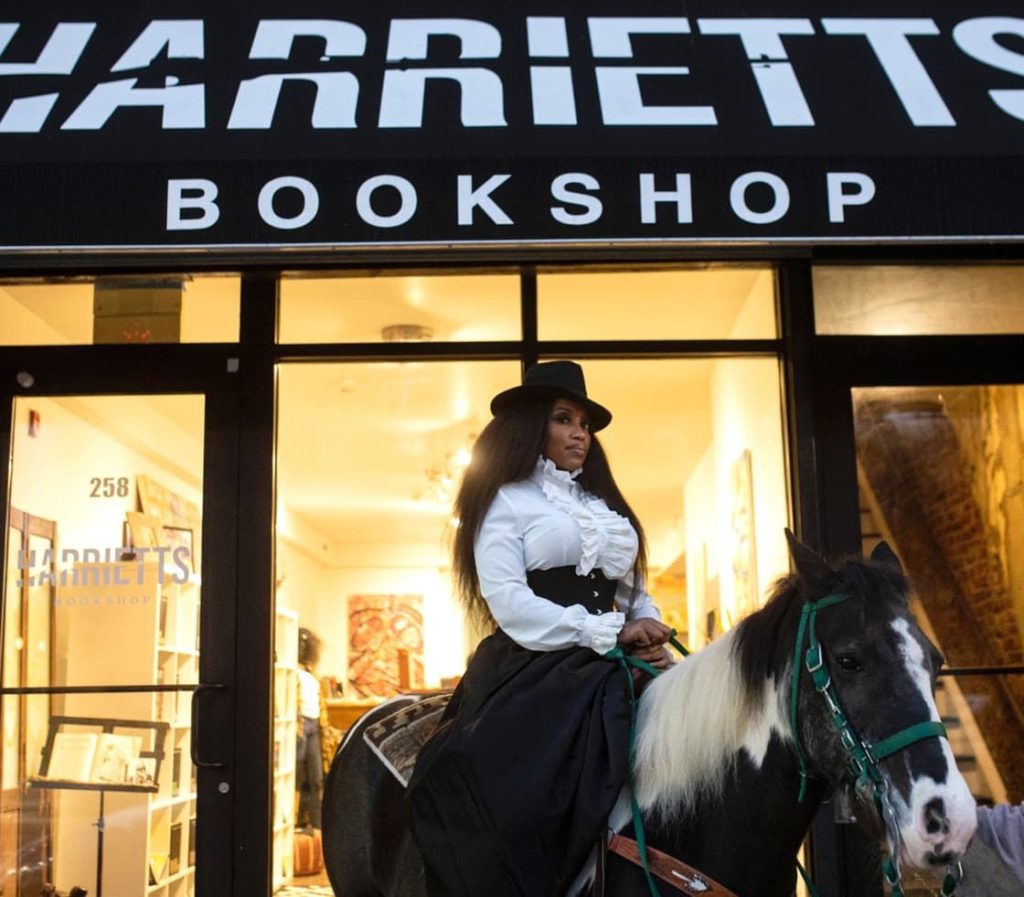
Inside the heart of Philadelphia’s historic Fishtown neighborhood lies Harriet’s Bookshop. As soon as you step foot underneath the black and white banner (The word “Harriett’s” sliced cleanly through the middle by a machete, a symbol of women’s power), you immediately can tell that this is more than just a bookstore; this is a monument of a story of resilience, a testament to the power of literature, and a celebration of inclusivity in a place historically known for its different demographic.

As soon as you step inside you are greeted with an array of colorful book covers—vessels for the words procured by owner, Jeannine Cook, that tell stories of unheard voices. Maybe you take a seat in one of the cream or coffee colored arm chairs, or perhaps to move to watch the people moving down Gerard Avenue as you sip your coffee from the local cafe down the street. Perhaps the slightest hint of fragrance illuminating from a scented candle or incense dances by your nose as it invites you to explore what this shining jewel of a store has to offer you, to tell you. This blog embarks on a journey through the remarkable past of Harriett’s Bookshop, highlighting its indomitable founder, Jeannine Cook, and the plethora of obstacles and challenges she confronted in redefining the very concept of what a bookshop can be within the Caucasian boundaries of Fishtown, Philadelphia.

Going back to the town’s early history, Fishtown, with its predominantly white demographic, is a neighborhood formed by the working class immigrants that called the area home, its identity interwoven with the fabric of its red-brick, historic buildings. For years, Fishtown stood as a symbol of tradition—one could even argue that it had become a “white place” in terms of its community makeup. However, the narrative of this neighborhood underwent a profound transformation with the arrival of Harriett’s Bookshop, one that paralleled the change the entire Nation would go through at the turning of the decade.
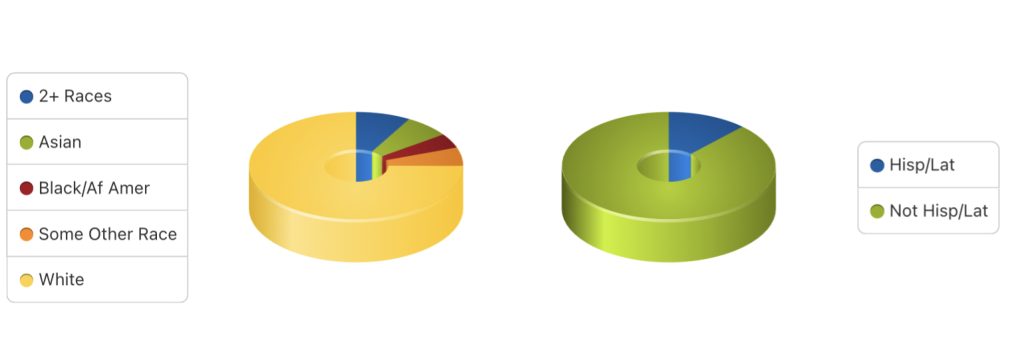
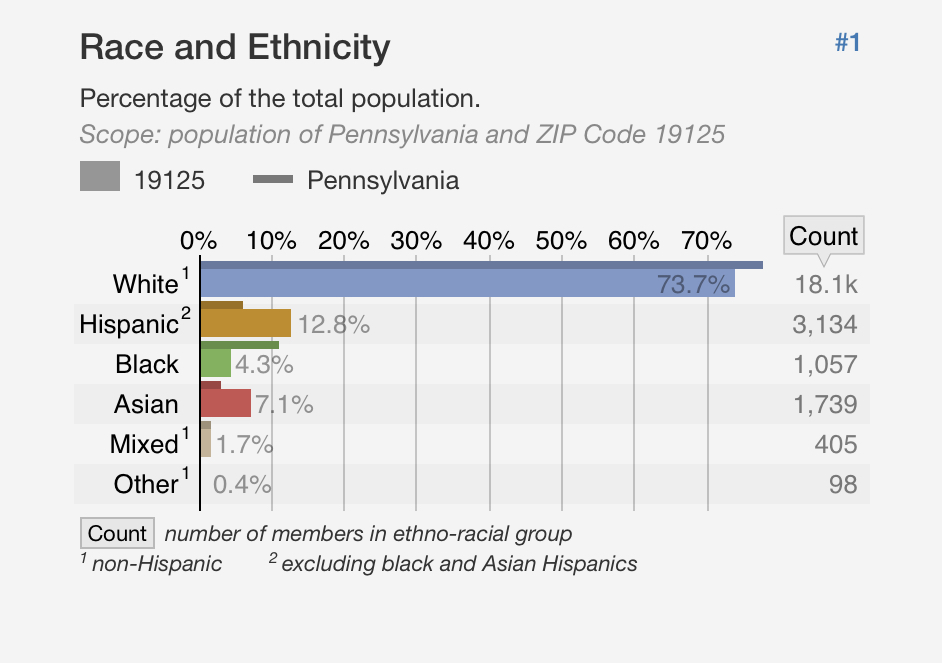
The above graphic (taken from claritas360.com) depicts the racial makeup of Fishtown. 73% of the town of only 25,000 is made up of white folk, with the remaining percentage being made up of 12% Hispanic folks, 7% Asian, and only 4.3% black (statisticalatlas.com).
It is clear to see that the neighborhood of Fishtown was not one known for its diversity, and that would prove to be a huge challenge for Cook as she embarked on her journey of spreading knowledge and empowering black women—and other writers throughout the community.

The story of Harriett’s Bookshop traces back to Jeannine Cook’s early years. In the third grade, she discovered a deep fascination with the remarkable Harriett Tubman, an iconic figure synonymous with resilience and courage. Cook was fascinated by Harriett’s perseverance and bravery while leading countless slaves to freedom, and this admiration for Tubman stayed with Cook throughout her life. Simultaneously, however, Cook’s mother, Celia, was facing an extraordinary challenge of her own during this time period—she was losing her sight, and before long was considered legally blind. In a remarkable display of determination not too unlike Harriett herself, and amongst unlimited familial support, Jeannine and her two sisters stepped up to read their mother’s textbooks aloud to her and transcribe her dissertation. Cook’s mother’s remarkable achievement was earning her master’s degree in theology from Richmond Virginia Seminary despite her roadblocks, with the help of her girls, an endeavor that symbolized triumph over adversity and that was only the beginning of Cook’s desire for empowering people through literature.
After successfully completing her college education, Jeannine Cook harbored the dream of opening a bookstore. She even managed to purchase a property in 2017.
However, fate had different plans.
A devastating fire shattered her dreams and compelled her to temporarily put her vision on hold. Instead, she turned her attention back towards a career in teaching, yet her passion for writing and commitment to education persisted—an unwavering flame.
Then, the world was turned on its head.
In 2020, inspired by an email from her sister and fueled by her lifelong love for writing, Jeannine Cook embarked on her most ambitious project yet. She compiled and published an anthology of short stories titled “Conversations with Harriett.” Significantly, she chose to spell Tubman’s first name with two T’s, a tribute to the legendary figure, who chose to spell her name with that specific spelling. This project marked a crucial step toward realizing her vision of creating a space where voices previously unheard would find their place.
Undeterred by the setbacks and challenges that life had thrown her way, Jeannine Cook continued her pursuit of opening a bookstore. She stumbled upon another vacant storefront in Fishtown, signed a lease, and, in January 2020, Harriett’s Bookshop quietly opened its doors to the public. What set it apart was an unmistakable storefront adorned with a banner featuring the store’s logo, a machete blade boldly cutting through the word “Harriet’s.” In a neighborhood steeped in history and tradition, Harriett’s became a breath of fresh air, a place where books authored by Black women took center stage.

The establishment of a bookstore in Fishtown posed a unique set of challenges. Friends and relatives initially expressed reservations about the location, given Fishtown’s historical identity rooted in the working class fish merchant industry—a sector notably dominated by white immigrants. The very location of Harriett’s Bookshop served as a symbolic challenge, especially when the tumultuous year of 2020 and the deaths of countless black citizens brought the fight of the Black Lives Matter Movement to the forefront of the nation’s consciousness. Cook knew that this was something she couldn’t shy away from. The nation needed a wake-up call, and by God were they about to get one.
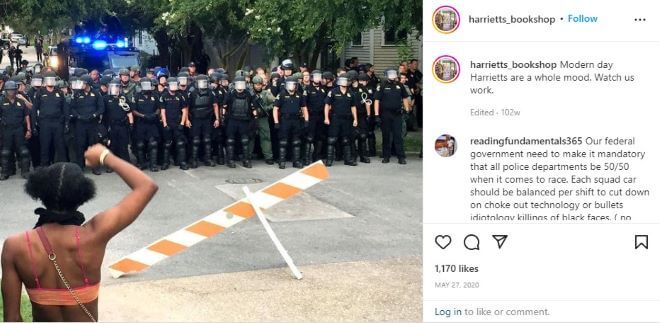
In the face of a global pandemic and the wave of protests ignited by the police killing of George Floyd, Harriett’s Bookshop remained a vocal advocate for change. Jeannine Cook utilized the bookstore’s social media platform to amplify her message, sharing powerful images that included one of herself kneeling for nine minutes in front of a line of police officers. This powerful gesture was a solemn reminder of George Floyd’s tragic death, a symbol of solidarity with a cause that transcended the confines of a bookstore.
The pandemic and the Black Lives Matter protests served to test the resilience of Harriett’s Bookshop, yet it never wavered. Instead, it became an essential part of the community, fostering trust and creating a safe space for minority communities within Fishtown. Harriett’s Bookshop transformed from a mere retail space into a symbol of hope and unity.
When the pandemic struck in 2020, Harriett’s Bookshop had been in business for a mere six weeks. As any person alive during 2020 (that’s you!) would know, the COVID-19 pandemic swept through the nation and and was the Grim Reaper knocking on the front door of hundreds, if not thousands of small businesses around the country. Bookstores were no exception to this culling, as many struggled to find an audience during the pandemic, and didn’t have the live and interactive customer base that small, indie stores thrive on (Time.com)
This posed a significant threat to the fledgling business. However, Harriett’s didn’t back down.
Cook – Technical.ly.com
“COVID is all we know. We opened in February and had to shut down in mid-March. Our whole existence has been with COVID by our side in some way. Also, the uprisings in the country have had an effect on our business as well. We’ve only known the roller coaster.”
Cook set up tables outside the shop, along with a donation box on an “honors system,” placing her trust in the local community to support essential workers by purchasing books. She even made headlines by delivering books door-to-door on horseback, a testament to her unwavering commitment to her community.
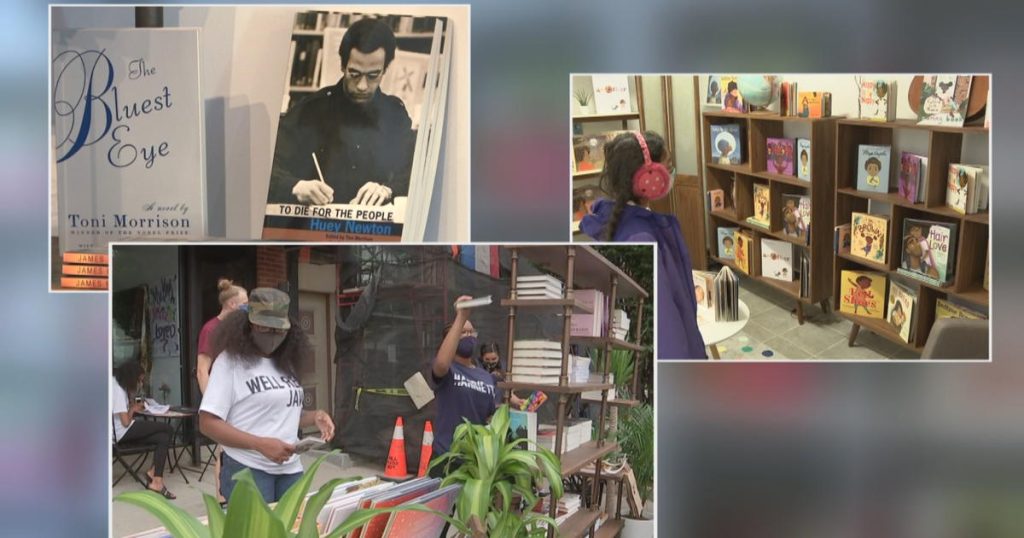
Jeannine Cook’s commitment to her community eventually led to the establishment of “Harriett’s House,” a dedicated space for gathering, learning, and healing. Through a successful GoFundMe campaign, she raised the necessary funds to purchase a larger building in Fishtown, ensuring her vision for the bookstore’s future. This space would be nearly three times larger than the original store, allowing for more extensive community engagement and programming.
Harriett’s Bookshop is not just a bookstore; it’s a testament to the power of perseverance, the resilience of the human spirit, and the impact of a dedicated community leader. Jeannine Cook’s journey, from a young admirer of Harriett Tubman to a passionate educator and entrepreneur, embodies the transformation of a “place” in Fishtown. In the insightful words of the author of “Liberation through Literacy,” Joshua Clark Davis, “Black booksellers positioned their stores as a new generation of black public spaces, welcoming a wide range of customers, activists, and curious community members. Like other active businesses, black booksellers understood their shops as free spaces or sites of liberation and empowerment” (Davis, 37). These words resonate strongly with the story of Harriett’s Bookshop and the indomitable spirit of its owner. Harriett’s Bookshop was established with a mission identical to the black bookstores of the 1960s, during the peak of the civil rights movement, to which the sentiments expressed by Davis describe.
Cook’s unwavering dedication to celebrating Black culture, amplifying diverse voices, and creating a tight-knit literary community mirrors the very essence of the quote. Her perseverance in the face of challenges reflects the understanding that black booksellers played a crucial role in fostering spaces of empowerment and liberation for their communities. Harriett’s has redefined the very essence of this historic neighborhood, challenging norms, celebrating diversity, and embracing the voices of Black women.
As “Harriett’s House” takes shape, Harriett’s Bookshop is poised to become an even greater beacon of hope, a space where ideas, stories, and change converge. It symbolizes the relentless pursuit of a dream, the resilience to weather storms, and the unwavering commitment to the community. Harriett’s Bookshop is more than a bookstore; it’s a testament to the enduring power of literature and the transformative impact of a visionary leader. As Cook continues to fight for a National Holiday celebrating Harriett Tubman, the woman that inspired the creation of this store and all the good that has come forth since its birth, let her perseverance reaffirm her store’s role as a nexus of social progress, where history, culture, and advocacy intertwine to shape a brighter future.
Research and Images Taken from:
Beck, Tom. “Historians, Community Advocates Fret over the Future of Former Penn Home Building in Fishtown.” Star News, 14 Oct. 2020, starnewsphilly.com/2020/10/13/historians-community-advocates-fret-over-the-future-of-former-penn-home-building-in-fishtown/.
Butler, Michael. “Harriett’s Bookshop Owner Jeannine Cook Uses Resilience to Write Her Own Story.” Technical.Ly, Technically Media, 16 Aug. 2023, technical.ly/diversity-equity-inclusion/harriets-bookshop-jeannine-cook/.
Chow, Andrew R., and Annabel Gutterman. “How Coronavirus Is Affecting Independent Bookstores.” Time, Time, 22 Apr. 2020, time.com/5822767/coronavirus-bookstores-amazon/.
Davis, Joshua. “Liberation through Literacy.” From Head Shops to Whole Foods: The Rise and Fall of Activist Entrepreneurs, Columbia University Press, New York, 2020.
Harrietts Bookshop (@harrietts_bookshop) – Instagram, www.instagram.com/harrietts_bookshop/. Accessed 9 Oct. 2023.
“Harriett’s Bookshop Seeking Permanent Home in Fishtown.” PhillyVoice, 3 May 2021, www.phillyvoice.com/harriets-bookshop-fishtown-philadelphia-gofundme-jeannine-cook/.
Nentwig, Lee. “Jeannine Cook on Harriett’s Bookshop and Upcoming ‘Sisterhood Sit-In.’” NKCDC, 1 Dec. 2020, nkcdc.org/harrietts-bookshop/.
“Prizm® Premier.” Claritas, claritas360.claritas.com/mybestsegments/#zipLookup. Accessed 8 Oct. 2023.
“Race and Ethnicity in ZIP Code 19125, Pennsylvania (ZIP Code).” The Demographic Statistical Atlas of the United States – Statistical Atlas, statisticalatlas.com/zip/19125/Race-and-Ethnicity. Accessed 8 Oct. 2023.
TodayShow. “Bookstore Named after Harriet Tubman Celebrates Women Authors, Artists and Activists.” TODAY.Com, TODAY, 12 Apr. 2021, www.today.com/money/philadelphia-s-harriett-s-bookshop-celebrates-women-color-authors-t214023.
Winberg, Michaela. “She Was Told Not to Open a Black-Owned Bookstore in Fishtown. She’s Doing It Anyway.” Billy Penn at WHYY, 17 Jan. 2023, billypenn.com/2020/01/18/she-was-told-not-to-open-a-black-owned-bookstore-in-fishtown-shes-doing-it-anyway/.
“With Harriett’s Bookshop, Jeannine Cook Honoring Women Authors ‘under the Guiding Light of Harriet Tubman.’” CBS News, CBS Interactive, 4 May 2021, www.cbsnews.com/philadelphia/news/harrietts-bookshop-jeannine-cook-fishtown-open-for-business/.

0 Comments